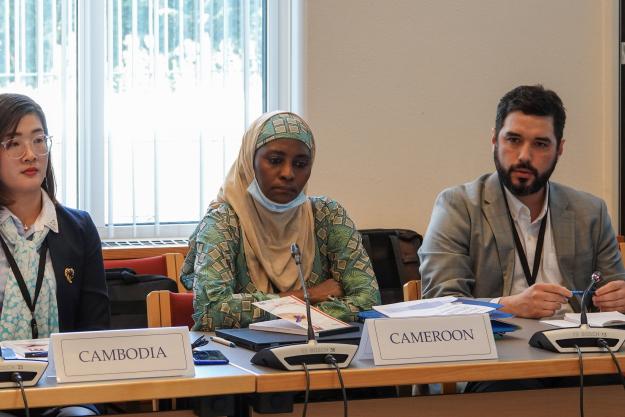
Participants at the opening ceremony of the 23rd OPCW Associate Programme
THE HAGUE, Netherlands—4 August 2022—The Organisation for the Prohibition of Chemical Weapons (OPCW) has launched the 23rd edition of the Associate Programme. The six-week programme provides a select group of participants from OPCW States Parties with the knowledge and experience to enhance the implementation of the Chemical Weapons Convention (CWC) in their home countries and take on technical assignments within the OPCW’s Technical Secretariat.
It is a unique combination of theoretical and practical learning modules intrinsically related to the implementation of the CWC.
In her remarks at the programme’s opening ceremony, the Deputy Director-General, Ms Odette Melono, said: “The programme provides a unique training opportunity to its various participants from industry, academia, and government to broaden the pool of experts and professionals available to build national capacities.”
The programme starts at OPCW Headquarters in The Hague. The associates will be introduced to CWC-related topics such as the OPCW’s verification regime, the inspection process, the role of National Authorities, international cooperation and assistance, and chemical safety and security management, as well as other issues related to national implementation of the CWC.
This will be followed by a three-week segment at the University of Surrey in the United Kingdom, where participants will develop skills tailored to operation of chemical plants and chemical engineering theories in simulated industry environments.

Participants at the opening ceremony of the 23rd OPCW Associate Programme
The associates will then return to the OPCW Headquarters for tabletop exercises on inspections for scheduled chemicals, as well as skills-related group work. The associates will be mentored by staff of the Technical Secretariat’s Verification and Inspectorate divisions as they take on research assignments related to the CWC in the fields of chemistry and chemical engineering.
The 30 participants to this year’s edition of the programme come from the following 30 OPCW Member States: Argentina, Armenia, Belarus, Botswana, Brazil, Cambodia, Cameroon, Chile, Colombia, Cuba, Democratic Republic of the Congo, Ethiopia, Gambia, Ghana, India, Iraq, Kenya, Malawi, Mauritius, Niger, Nigeria, Pakistan, Philippines, Sierra Leone, Somalia, State of Palestine, Tanzania, Uganda, Uzbekistan, and Vietnam.
Background
The OPCW Associate Programme is a major international training project to enhance the peaceful uses of chemistry of OPCW Member States, as stipulated by Article XI of the Chemical Weapons Convention (Economic and Technological Development). Capacity building under Article XI focusses on integrated chemicals management, enhancing laboratory capabilities, and promotion of chemical knowledge.
Now in its 23rd year, the Programme has trained more than 540 experts from 121 countries.
More than 20 former participants have joined the Technical Secretariat as staff members and several have served on the OPCW’s Scientific Advisory Board.
As the implementing body for the Chemical Weapons Convention, the OPCW, with its 193 Member States, oversees the global endeavour to permanently eliminate chemical weapons. Since the Convention’s entry into force in 1997, it is the most successful disarmament treaty eliminating an entire class of weapons of mass destruction.
Over 99% of all declared chemical weapon stockpiles have been destroyed under OPCW verification. For its extensive efforts in eliminating chemical weapons, the OPCW received the 2013 Nobel Peace Prize.
